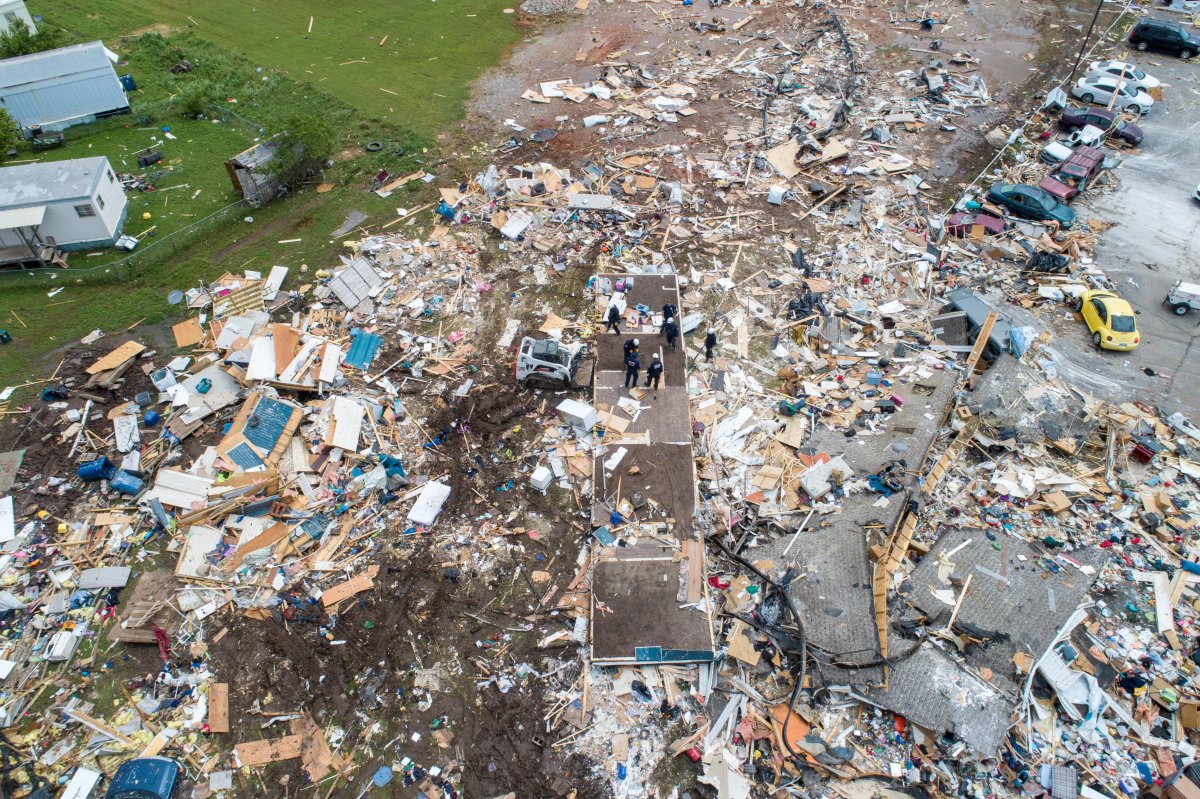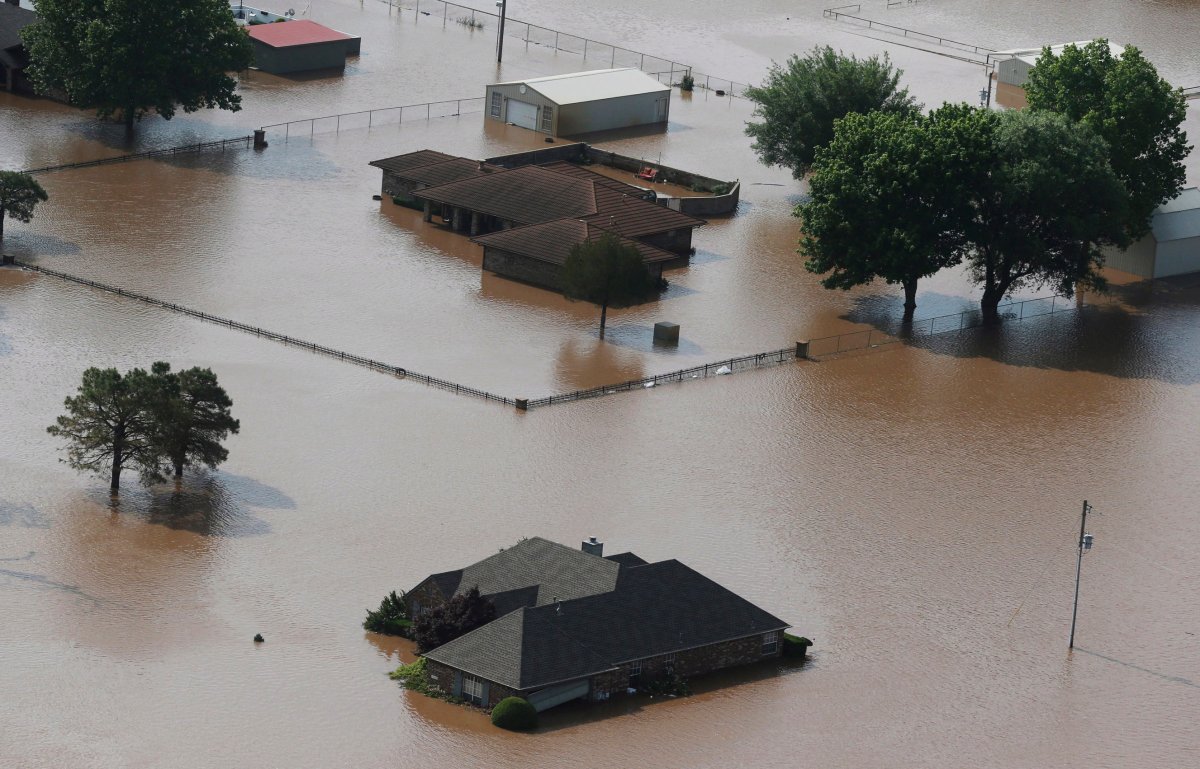Deadly tornadoes, historic flooding and record-breaking heat waves are hitting parts of the central and southern United States, resulting in at least five deaths in a span of a week.

READ MORE: 2 dead after tornado rips through mobile home park, motel in Oklahoma
And while many residents are left picking up the pieces after tornadoes and fierce winds ripped through their homes last week, those in the region are still bracing for more violent storms this week in what the National Weather Service is calling “life-threatening” and “catastrophic” flooding.
Here is a rundown of the wild weather gripping parts of the U.S.
Deadly tornadoes tear through central U.S.
Since May 21, 191 tornadoes have been reported in the U.S., mostly in the central region, according to ABC News.
Oklahoma is still reeling from a spate of deadly twisters that tore through the region over the weekend.
On Saturday, two people were killed and 29 others injured after a tornado hit a town near Oklahoma City.
The first tornado touched down in El Reno, about 40 km west of Oklahoma City, late Saturday night. It crossed an interstate and levelled a motel before tearing through a trailer park, flipping and levelling homes. Hundreds were left homeless.
On Sunday, rescue workers were continuing to search for survivors in the rubble left by the tornado that reached wind speeds of 219-266 km/hr.
A second tornado hit the Tulsa suburb of Sapulpa Sunday, more than 160 kilometres away. It damaged structures, uprooted trees and toppled over power lines.
WATCH: Tornadoes hammer Oklahoma City area

The Sapulpa Police Department said on its Facebook page that it hadn’t heard of any deaths and that only a few minor injuries had been reported.
Oklahoma’s weekend storms come after a week of tornadoes, severe rain and flooding in the central U.S., including a monster tornado that hit Jefferson City, Mo., on Wednesday.
The deadly storm in Missouri killed at least three people in the southwestern part of the state.
In Iowa, local media reported that a 74-year-old woman was killed when a tornado demolished her farm home early Wednesday morning.
And the wild weather isn’t stopping yet. On Tuesday, a storm could bring tornadoes, hail and damaging winds from Texas up to Wisconsin.
WATCH: Missouri’s capitol begins cleanup after tornado rips through city

Worst flooding in recorded history
“Near catastrophic flooding” is happening along the Arkansas River, according to the National Weather Service.
Governor Asa Hutchinson on Friday declared a state of emergency due to the storms and flooding that began May 21, saying that “severe flooding of historic proportion will likely result.”
In Arkansas’ second-largest city, Fort Smith, residents are preparing for what meteorologists on Sunday predicted will be the worst flooding in recorded history.
The National Weather Service said in the statement that levee “overtopping” is likely with “significant impacts to life and property across a very large area.”
In Tulsa, Okla., authorities advised residents on Sunday to consider leaving for higher ground because the Arkansas River is stressing the city’s old levee system.
Flash flooding
The severe storms that unleashed the tornadoes in Oklahoma also caused heavy rains to roar through the region last week.
On Friday, Gov. Kevin Stitt declared a State of Emergency for all 77 Oklahoma counties impacted by flooding and severe storms.
And last week, Missouri Governor Mike Parson declared a state of emergency, citing flash flooding, “straight-line winds,” heavy rain and hail.
“Missouri is experiencing a very dangerous severe storm system with multiple threats that must be taken seriously,” Parson said in a written advisory. “I urge all Missourians to closely follow their local weather forecasts, take storm warnings seriously, and quickly act to protect themselves and their families when necessary.”
The violent thunderstorms are expected to continue throughout the week.
“More flash flooding is expected over the next few days across parts of the central U.S.,” the National Weather Service tweeted.
Dangerous heat waves
Temperatures are soaring in the Deep South, causing potentially life-threatening conditions.
In southeastern U.S. temperatures are averaging around 38 C, according to the National Weather Service.
Some locations, such as Columbia, S.C., and Augusta, Ga., are expected to reach record-breaking triple digital temperatures Monday.
Atlanta, Ga., hit 34 C Saturday, breaking a record set in 1960. That same day, Charleston, S.C., and Tuscaloosa, Ala., both reached a record of 36 C, while Pensacola, Fla., set a new record with a high of 35 C.
— With files from Reuters and the Associated Press









Comments